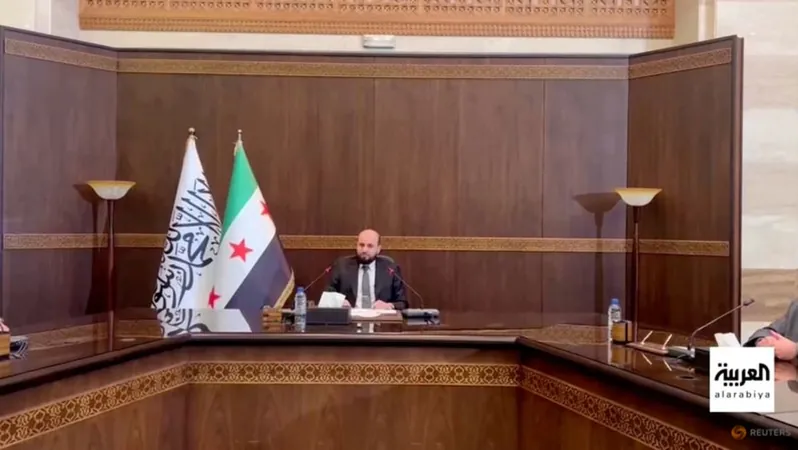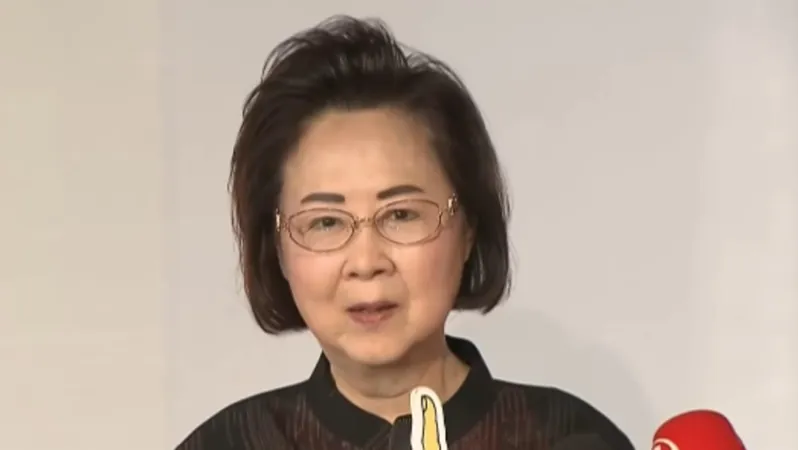
New Syria Prime Minister Pledges Protection for Minority Rights Amidst Political Transition
2024-12-11
Author: Wei
DAMASCUS - In a groundbreaking interview published today, Syria's newly appointed Prime Minister, Mohammad al-Bashir, emphasized his commitment to safeguarding the rights of all religious and ethnic groups in the country.
This declaration comes in light of the recent political upheaval following the ousting of president Bashar al-Assad, which has left the nation navigating an uncertain future.
Assad was forced to flee amidst a rapid offensive led by the rebel alliance Hayat Tahrir al-Sham (HTS). The departure marked a pivotal moment, ending over five decades of oppressive governance by the Assad family. The ensuing celebrations among Syrians, both domestically and internationally, reflect a collective yearning for freedom after years of persecution.
As the dust settles, HTS leaders, including al-Golani (real name Ahmed al-Sharaa), have taken steps to reassure the populace that there will be no repression of minorities. "We will not pardon those involved in torturing detainees," Golani insisted, calling for the extradition of such individuals to face justice. This commitment is crucial for many families still searching for closure regarding their loved ones who went missing during Assad's brutal regime.
Bashir, appointed as the transitional head of government, stated, “Because we are Islamic, we will guarantee the rights of all people and all sects in Syria.” His administration, which aims to bridge the divides of a multi-ethnic and multi-confessional society, will be tasked with leading the nation through a period of reintegration and reconstruction scheduled to last until March 1.
In the city of Aleppo, many citizens express a cautious optimism about the future, with shopkeeper Ramadan Dali declaring, "We are starting to feel safe." However, there are lingering concerns, particularly regarding the return of displaced individuals and the rising cost of living. Local mother Juman Khilaly voiced her fears for her child's education, questioning the stability of everyday life.
In parallel, the aftermath of Assad’s fall has provoked significant reactions. In Qardaha, where Assad's family hails from, rebel fighters and local youth were seen burning the tomb of Assad's father, symbolizing a hostile rejection of the old regime. The Baath party, which had dominated Syrian politics, announced a suspension of its activities until further notice, and plans to hand over its assets to the new authorities.
The devastating toll of Syria’s civil war, with over 500,000 fatalities and millions displaced, looms large over Bashir's goals. He has ardently called on Syrians living abroad to return to their homeland, stating, "Syria is now a free country that has earned its pride and dignity. Come back."
Amidst these developments, the reopening of the main international airport in Damascus is imminent, a sign of the country's gradual return to normalcy. However, the UN envoy for Syria, Geir Pedersen, has urged a cautious approach, warning that any mistakes in the transition could foster new divisions and potential unrest. The international community remains vigilant; UN Secretary-General Antonio Guterres reiterated the commitment to supporting a smooth transition of power.
Looking ahead, the future of Syria will heavily depend on how the new leadership navigates internal and external pressures, including regional security concerns. Nations like Germany and France have encouraged neighboring powers to avoid complicating the delicate political landscape as Syria attempts to stabilize following years of turmoil.
In a surprising twist, former U.S. Ambassador Robert Ford has noted that the emerging rhetoric from HTS, including their openness to international monitoring of any potential chemical weapons, warrants a cautious but open-minded approach. "Can you imagine Osama bin Laden saying that?" he remarked, highlighting the dramatic shift in discourse and the potential for a new direction in Syrian politics.
As the country embarks on this new chapter, the resilience and resolve of the Syrian people will be tested, but there is a glimmer of hope for a future where rights are respected and justice prevails.



 Brasil (PT)
Brasil (PT)
 Canada (EN)
Canada (EN)
 Chile (ES)
Chile (ES)
 España (ES)
España (ES)
 France (FR)
France (FR)
 Hong Kong (EN)
Hong Kong (EN)
 Italia (IT)
Italia (IT)
 日本 (JA)
日本 (JA)
 Magyarország (HU)
Magyarország (HU)
 Norge (NO)
Norge (NO)
 Polska (PL)
Polska (PL)
 Schweiz (DE)
Schweiz (DE)
 Singapore (EN)
Singapore (EN)
 Sverige (SV)
Sverige (SV)
 Suomi (FI)
Suomi (FI)
 Türkiye (TR)
Türkiye (TR)